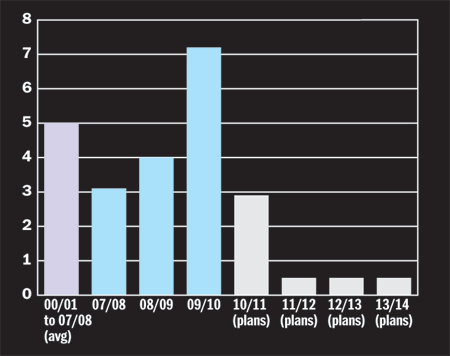By Tony Travers
20 August 2009
All the major parties are at sea over how and where to cut spending. Tony Travers breaks the holiday mood with a reality check
The contrasting styles of summer holiday chosen this year by the prime minister and the leader of the Opposition say much about contemporary British politics. Gordon Brown let it be known he would be taking ‘a few days off’, while we later discovered that part of his break would be spent doing community work in his constituency. The PM’s ‘staycation’ would be taken in Scotland and the Lake District. David Cameron, by contrast, was quoted as saying ‘people deserve a good holiday’ before heading off to Greece and then France. He also admitted to starting his break by reading a ‘trashy novel’.
Brown is like Margaret Thatcher, who was notorious for hating holidays and would rush back to Downing Street for the smallest crisis. Cameron looks more like Tony Blair, with his taste for exotic sojourns in the homes of celebrities such as Sir Cliff Richard. Everyone has, presumably, been steering clear of oligarch-owned yachts.
What Brown, Blair and other political leaders should have been able to do as they relax is to reflect on the state of politics, the economy and everything else. The party conference season is only a month away. From then on, there will be a near-continuous election campaign until polling day early next year. Following the battering received by MPs this year, notably because of the expenses scandal, this will mean one particularly heavy political year after another. Moreover, the country’s future is such that government will become even more challenging than normal in the years ahead.
Gordon Brown will also start the new political year attempting to avoid a further leadership challenge. Following Labour dissidents’ abortive effort to unseat him last June, the threat of another putsch has never really gone away. Although most MPs of all parties assume Labour has already lost the 2010 election, some government backbenchers will still be thinking that if Brown could be replaced with Alan Johnson they might just hold their own seat. A change of leader, they will calculate, could keep 30 to 50 Labour MPs in Parliament and, more importantly, make it far easier for the party to return to power in 2014 or 2015.
David Cameron faces a different problem. Precisely because he is heir-apparent to the threadbare realms of Downing Street, people will expect him to come up with significantly more detailed plans than he and his colleagues have thus far managed. Battering the prime minister at Question Time once a week might win the annual Punch and Judy award, but it is a long way from coping with the banking crisis, public service funding or climate change. We all know governments lose elections rather than oppositions win them. But the electorate has to have confidence in the Opposition before it will let them win: remember Neil Kinnock in 1992.
At the end of July, Cameron basked in rare praise from none other than Lord Mandelson who, before slipping off for a break in Corfu (‘no Russians, no yachts, no Osborne’), in an interview with the London Evening Standard accepted that the Tory leader had got the better of Brown over the issue of spending cuts versus investment because: ‘We should have been faster in realising how they were attempting to define us.’ This was, in reality, classic Mandelson tactics, as it was actually Labour (especially uber-Brownite Children’s Secretary Ed Balls) who had attempted to define the Conservatives as cutters.
Subsequently, Mandelson launched a coruscating attack on Osborne following the latter’s speech to Demos on August 11, which argued that the Conservatives were now the progressive party in British politics. Mandelson attempted not only to pour scorn on the idea of the Tories as progressives, but also to argue that there would, after all, be a difference between Labour’s spending plans and the Conservatives’ reductions in spending provision. Osborne clearly irked Mandelson, and not for the first time.
Labour found they had deliberately placed themselves on the wrong side of a major political argument, just as they had with the Gurkhas issue. This failure is strong evidence that the Brown Downing Street, which has long been accused of being rudderless, is also not very good at politics. Mandelson would not have been so stupid as to allow Labour deliberately to create a division between itself and the Tories without first checking if his party was on the right side in terms of public opinion.
With the holiday season coming towards its end, the prime minister might wish to dwell on how he can get his political machine back on the road. Simply waiting for something to turn up looks less and less convincing as the weeks roll by.
Up to now, local government, the health service, education, the police and other public services have been left to guess what will happen to them in the years ahead. It is a given that immediately after the general election there will be savage spending cuts, but until that point all the major political parties will speak only in generalities. ‘Delivering efficiencies and tightening our belts’ is one thing. Cutting schools’ spending by 5% in real terms would be quite another. Indeed, public providers are in the position of Britain in the autumn of 1939, living through a ‘phoney war’, with massive cuts expected but not yet started.

The Institute for Fiscal Studies has been clear about the future path of public spending. In the IFS/King’s Fund publication How cold will it be?, published a month ago, the two organisations analysed the possible futures facing the NHS and the implications of more and less generous treatment of health for the rest of public spending. It is clear that even on the most optimistic of assumptions, the NHS will face a sharp slowdown in funding increases and could even face zero growth. Other services will be cut harder if the NHS is given real spending increases; a live issue, as the furore over US versus UK medical care polarises the two parties.
If the economy becomes locked in a longer-term recession or anaemic growth, the pressures would be even greater. Councils will be lucky to receive frozen cash grant allocations, with barely any more for the police, fire and other services. Defence, which has recently risen up the political agenda because of casualties in Afghanistan, might now have to be protected along with health. Schools might, as a result, lose their protected status.
The Brown and Cameron holidays will, with luck, have cleared the minds of the party leaders and given them the confidence to come clean about the future of public spending and the reforms needed to accommodate these new plans. For Liberal Democrat leader Nick Clegg, there is a related issue of how to sound coherent about spending and services while making it possible to imagine joining a minority Labour or Conservative government. The possibility of a ‘hung’ Parliament remains significant. If it does not happen in 2010, it might well do so at the subsequent election.
All the signs are that the big cutback in public expenditure will start in 2010/11. The graph on this page shows the average real-terms growth in public spending over the period 2000/01 to 2007/08, and for each of the three years up to 2009/10. Estimates based on the chancellor’s 2009 Budget report are shown for 2011/12 and 2012/13. It is important to note that the graph shows the present government’s future plans. The mood music coming from the Tories suggests that their projected numbers would be lower than Chancellor Alistair Darling’s – suggesting, at best, a zero real-terms increase in overall spending.
With the NHS, international development and possibly defence being given preferential treatment, other public services, including schools, face real-terms reductions. For less-favoured provision such as local government, the environment, agriculture, business support, housing, regeneration, transport, arts & culture, higher education, the fire service and even the police, annual real cuts of 2%–3% look inevitable. Within this group of to-be-cut services, any localities or subsectors that are less needy are likely to lose 5% or more per year for several years.
Any government contemplating such a reversal in the direction of public spending will surely have to have a comprehensible rationale for what happens where. For the first time since 1945, Britain faces a decade in which public services will shrink. This shrinkage will mean expenditure drops from a zenith of about 50% of gross domestic product in 2010 back towards 40%. None of the major parties has yet owned up to the scale or detail of the spending reductions that will take place. This failure has stopped politicians needing to develop a coherent public service strategy of the kind that is now surely required for the years 2010 to 2020.
The government that takes office after the general election will have to consider a number of new approaches to public services, including decentralised pay bargaining, outsourcing (or as some see it, privatisation), charging for previously-free provision and/or means-testing. Joint provision will also be a priority. Hypothecated taxation – in the shape of a one-off payment of £20,000 for care in old age – has already been suggested to help pay for care for the elderly. The Conservatives have floated the idea of road-pricing to pay for new roads. Any high-speed railways built will have to be funded by fares.
A major challenge for central and local government as Britain’s public service ‘Armageddon’ moment arrives is how to explain what happens to a cynical and mistrustful public. After their recent expenses-related battering, ministers and other Parliamentarians command tragically little public respect. A general election might re-set the democratic clock to some extent, but it will not give national politicians the kind of credibility they will require to tell a convincing story about what they will have to do to cut back the size and possibly the impact of the state.
The alternative would be for the 2010 government to cut spending while simultaneously stating service quality will be unaffected. This will be a tempting possibility, but it should be resisted. The period of adjustment that lies ahead will provide an opportunity for politicians and officials to restructure the provision of services. It is very unlikely that the public sector will look the same by 2020. In particular, politics will have to determine where the state can reasonably continue to expand provision in line with longer-term growth in the economy and where the government will, over time, stand back. What will the role of the private sector be? Can not-for-profit providers be used more extensively?
There is an opportunity here for Brown as he desperately seeks a ‘narrative’ for his tired and idea-free government. Similarly, Cameron would look more convincing if he were able to describe a path for public service innovation. The Liberal Democrats could steal a march on both the bigger parties by being the party that articulated a future for Britain’s public sector.
No-one within government or outside has the faintest idea what will happen next. There is a vague certainty that in May or June 2010 there will be an emergency Spending Review that will start the era of slashing and burning. Whitehall will be re-reorganised. The core of government will similarly be reformed. Bonfires of red tape and a cull of quangos will then be staged for the public benefit. Let’s hope that our politicians return from their summer breaks with a proper, worked-through, policy for the public services. Time, like money, is running short.
Tony Travers is the director of the Greater London Group at the London School of Economics



















